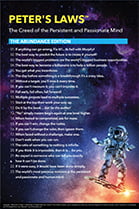
TLDR
- The education system is broken, and it’s up to us as parents to instill the right mindsets and values for our kids.
- Three critical Mindsets to instill in your kids are: Passion/Purpose, Curiosity, and Grit.
- Expose your child to all the exciting paths open to them. Then, let them follow their Passion.
- The best way to teach is to show – not tell.
- To raise the men or women the world needs, be the man or woman the world needs!
The Abundance Index
Announcing the Abundance Index, each week we ask our community how they are feeling about the state of the world. Your mindset matters: perception and belief generate real outcomes. If you’d like to weigh in on how you’re feeling for next week’s Index results, click here.

HOW TO RAISE GIANTS: PARENTING AS AN ENTREPRENEUR
Raising kids today amid all of the digital distractions, games, and social media platforms can be challenging.
We all want our kids to become successful, happy, and contributing adults.
I get asked for advice on parenting from my Abundance Community all the time...
“How much computer time do you give your kids?”
“What technology should kids study today to be successful in the world?”
“Peter, how do you balance work and family?”
The truth is my kids are still young (11-year-old fraternal twin boys), and my wife and I are navigating all of these issues constantly.
For me, parenting is about striking a balance between inspiring kids to think big (by showing, not telling), while not pressuring them to follow your exact footsteps.
It’s also about allowing kids to be their own, individual thinkers, to find their own passions and purpose in life, while exposing them to the vast repertoire of options available to them.
My goal for our twin boys is to expose them to as many ideas as I can, and then fan the flames of whatever they want to do.
My dear friend Naveen Jain has raised three incredibly successful kids (who I had the pleasure to mentor earlier in their lives). I recently had a conversation with Naveen on my podcast, and he shared a powerful message that stuck with me:
“Our job as parents,” Naveen said, “is to leave a better world for our children, but also to leave better children for the world.”
In today’s blog, I’m sharing a few guiding principles that I believe are critically important in parenting.
Let’s dive in…
EDUCATION IS BROKEN & IT SUCKS
There are probably lots of issues with today’s traditional elementary schools, but I’ll just choose a few that bother me most.
-
Grading: In the traditional education system, you start at an “A,” and every time you get something wrong, your score gets lower and lower. At best it’s demotivating, and at worst it has nothing to do with the world you occupy as an adult. In the gaming world (e.g., Angry Birds), it’s just the opposite. You start with zero and every time you come up with something right, your score gets higher and higher.
-
Sage on the Stage: Most classrooms have a teacher up in front of class lecturing to a classroom of students, half of whom are bored and half of whom are lost. The one-teacher-fits-all model comes from an era of scarcity where great teachers and schools were rare.
-
Relevance: When I think back to elementary and secondary school, I realize how much of what I learned was never actually useful later in life, and how many of my critical lessons for success I had to pick up on my own. (I don’t know about you, but I haven’t ever actually had to factor a polynomial in my adult life.)
-
Imagination - Coloring Inside the Lines: Probably of greatest concern to me is the factory-worker, industrial-era origin of today’s schools: programs so structured with rote memorization that it squashes the originality from most children. I’m reminded that “the day before something is truly a breakthrough, it’s a crazy idea.” Where do we pursue crazy ideas in our schools? Where do we foster imagination?
-
Boring: If learning in school is a chore, boring or emotionless, then the most important driver of human learning, passion, is disengaged. Having our children memorize facts and figures, sit passively in class and take mundane standardized tests completely defeats the purpose.
An average of 7,200 students dropout of high school each day, totaling 1.3 million each year. This means only 69% of students who start high school finish four years later. And over 50% of these high school dropouts name boredom as the number 1 reason they left.
I explore these issues and what to do to reinvent schools in my blog: Reinventing Our Kids Education.
So, how do we raise our kids to be critical thinkers, filled with curiosity, passion, grit, and persistence?
Here are 3 principles I believe are critical:
Principle #1: Support Your Child’s Passion & Purpose
Growing up, my parents assumed that I’d follow in my dad’s footsteps and become a physician.
But I had different plans. Having been weaned on the Apollo Program and Star Trek, I wanted to become an astronaut and rocket designer.
In the end, I did get my Medical Degree to make my parents happy but ultimately split my time between medicine and space, and also earned my Aerospace Engineering degree (MIT) in order to pursue my own dreams.
I can definitively say that everything I’ve accomplished in my earlier life stemmed from that space passion: it drove me to learn, research, and strive. It was a pure intrinsic motivation.
Having been pressured to become a physician by my parents, I’ve vowed to support whatever my kids decide is their Passion and Purpose in life, and not to impose my personal desires on them.
This is not always easy, but I do my best to give them the freedom to let their curiosity flourish when discovering their passions.
At the end of the day, every human being’s path is meant to be different.
This is why my first rule of thumb with my kids is to help them discover their Purpose. Encourage them with new experiences, place them in new environments, and guide them through their personal journey of passion; no matter what this looks like for them on a practical level.
As Naveen mentioned during our conversation, it’s our role as parents to expose our children to everything imaginable before they choose their Purpose.
They can be passionate about anything they desire as long as they have done the work of diving into a haystack and finding the needle that suits their thread.
Principle #2: Ask Great Questions
Ever notice how some people ask “Why?” and others just accept the world the way it is?
In today’s digital world, we are bombarded with information from all corners and how we navigate this information will be the difference between success and failure.
When I drop my kids off at school, the last thing I say to them as they get out of the car is: “Ask great questions today.”
Why? During an age of ChatGPT and ubiquitous Artificial Intelligence, the quality of the questions you ask, rather than what you know, will make all the difference.
In my humble opinion, helping your kids to think critically and to ask great questions is the most important lesson you can teach them. (It’s also the critical advice I give to CEOs as well).
Having a Curiosity Mindset means not taking things at face value. You could argue that curiosity is responsible for all scientific and technological breakthroughs, because it’s rooted in the desire to seek the truth and explore the unknown. It’s also what will allow our children to discover new passions as they learn about the world around them.
Playing games with our kids is an excellent way to start exercising the curiosity muscle. Jane McGonigal, a renowned video game designer, shared with me that she put a whole wall in her house deemed “The Question Wall,” where her kids can add any questions that come to mind throughout their day, and then at the end of the week, each family member has to pick out a question and take 15 minutes to research the answer to it.
This refreshing exercise allows kids to reframe the way they think about curiosities and home in on the question they want the answer to. Here is where the concept of gamifying our kids’ education comes into play.
In another great example, Naveen told me a story about the importance he placed on “connecting the dots” when his kids were growing up.
Instead of telling his children a bedtime story (which is often the norm in our culture), he would give his kids three completely unrelated words, such as “monkey,” “apple,” and “ocean,” and would ask his kid to come up with a story to tell him. This allowed his kids to not only think beyond the unimaginable and the logical, but to spark their curiosity by intertwining points that don’t usually connect!
Principle #3: Have Grit, and Don’t Give Up
When the question of finding the balance between making time for our kids and our businesses comes up, I often quote Tony Robbins.
Tony once said, “It’s not about work-life balance; it’s about work-life integration.” I completely agree.
And often, as entrepreneurs, we can have a mindset of “I want to create this company and make this amount of money so that I can retire early and have more time to spend with my children.” But is that the example we want to set for our kids?
Children do what they watch us do, not what we tell them to do. As my friend Naveen discussed with me, if dad is sitting on the sofa watching the news when the kids go to school, and still doing the same when they get back home, regardless of dad’s successes, the child will grow up to think: “I want to be just like dad and get successful enough to sit at home and watch TV all day.”
That’s why leading by example is crucial to your kids' development. If they’re watching their parents build one company after another, tackle one huge problem after the other, or even spend their life achieving a Moonshot, then that’s what they will model their own work ethic after.
Another great tip is to expose your kids to the SAME things you’re being exposed to. Take them into work when possible, bring them with you to that science conference about technological breakthroughs, and let them simmer in your world so that you’re sharing the same intellectual language at home.
Above all, teach your children, as I like to teach mine, that patience is a virtue, but persistence to the point of success is a blessing.
There are only so many “Nos” before they get to a “Yes.” Count them.
FINAL THOUGHTS
There is no master manual to successful parenting, but I do know that to raise good human beings who are audacious thinkers and hard workers, we have to be precisely those things.
It’s not a show and tell. It’s just a show, and the show speaks for itself.
According to Dr. Deepak Chopra—a world-renowned pioneer in integrative medicine—a lot of our children’s happiness in life (up to 50%) will come from the mental upbringing we instill in them: the way we argue with our spouse, respond to demands from work, or react to the many small imperfections of everyday life. The way we show passion for our Purpose, and an endless grit to solve the world’s biggest problems.
So perhaps the best advice I can give you on how to be a good parent is to do all the things you know you need to do to be a good human being.
The downstream effects will follow.
Abundance360 is much more than an annual event.
It’s a carefully curated group of visionary entrepreneurs, investors, and thought leaders running companies ranging in value from $10 million to $10 billion from around the world.
Members benefit from year-round programming to broaden their perspectives and foster meaningful relationships.
The Abundance360 Summit is now Waitlist Only, but applications for the year-round Virtual Membership are still open for 2023.
EP #13 Moonshots and Mindsets:
How To Think Like A Billionaire With Naveen Jain
In this episode, Naveen and Peter discuss the framework for building a Moonshot company, how to raise a great family, and how billionaires think about new ideas.
Naveen is a serial entrepreneur and philanthropist driven to solve the world's biggest challenges through innovation. As the founder of Viome, Moon Express, World Innovation Institute, TalentWise, Intelius, and Infospace, Naveen is an intensely curious entrepreneur who is focused on audacious ideas that push humanity forward.
Peter's Picks
Each week I'll list 2-3 things I'm reading, thinking about, products I'm using, or experiments I'm running.
- The book Smarter Not Harder, by my friend Dave Asprey, is a powerhouse of information to improve your mindset: https://a.co/d/dscWEuD
- Another book recommendation but this time for your kids! Honestly, a treat for all ages: a sci-fi series that had me glued to its pages: the Bobiverse series.
- My niece sent me this TikTok that amazed me. Have you used Runway's GEN-1 video AI tool yet?
Topics: Abundance Entrepreneurship










